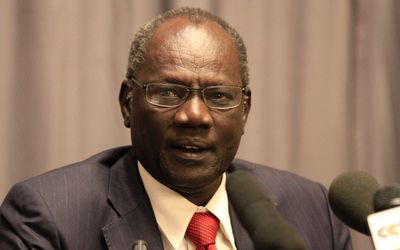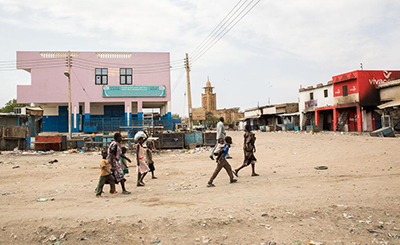From Fledgling to Failed
Even as the country collapses, South Sudan’s government will brook no criticism By Jacey Fortin JUBA, South Sudan – The shooting began around 5:15 on a Friday afternoon. Dozens of journalists had gathered in the pressroom at the Presidential Palace–a walled compound also known as “J1”–in the capital city. Following a few days of rising…
South Sudanese President Salva Kiir threatens to kill journalists
Nairobi, August 17, 2015–The Committee to Protect Journalists condemns statements made by South Sudan President Salva Kiir on Sunday in which he threatened to kill journalists for reporting “against the country.” Kiir made the statement at the airport in the capital, Juba, before flying to Addis Ababa to attend peace talks with former Vice President…

South Sudanese authorities silence three media outlets
Nairobi, August 5, 2015–Authorities in South Sudan have shut down three independent media outlets in the past five days, according to news reports and the outlets’ editors. The Committee to Protect Journalists condemns the closures, which come as international mediators seek to arrive at a peace deal between the government and the armed opposition following…
Five journalists killed when gunmen ambush convoy in South Sudan
Nairobi, January 27, 2015–Five journalists were killed on Sunday when unidentified gunmen ambushed an official convoy in South Sudan’s Western Bahr al Ghazal state, according to local journalists and news reports. The Committee to Protect Journalists condemns the attack and calls on authorities to apprehend the perpetrators and hold them to account.

South Sudan closes radio station, arrests editor
Nairobi, August 18, 2014–The Committee to Protect Journalists condemns South Sudanese authorities’ shutdown of the popular Catholic-run Bakhita Radio station in Juba, the capital, on Saturday and the ongoing detention of the station’s news editor. Security agents raided the outlet in the morning and arrested four staff members, according to the station’s managing director and…

South Sudan government warning: Don’t interview rebels
Last week, South Sudanese Information Minister Michael Makuei warned reporters in the capital, Juba, not to interview the opposition or face possible arrest or expulsion from the country. According to the minister, a lawyer by profession, broadcast interviews with rebels by local media are considered “hostile propaganda” and “in conflict with the law.”

South Sudanese towns suffer information vacuum
“This is the worst situation I ever reported since I started reporting in 2007,” BBC Media Action producer Manyang David Mayar told me after he left the restive town of Bor, Jonglei State in South Sudan. Forced to walk long distances carrying his suitcase on his head to escape the fighting in Bor, Mayar drank…